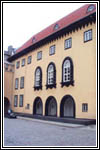 |
Vol 1, No 12
13 September 1999 |
|
|
 T H E A M B E R C O A S T:
T H E A M B E R C O A S T:
A Friendly Invasion Mel Huang It has become nearly an annual ritual: kilt-clad, beer-wielding, singing Scotsmen roaming Tallinn's Old Town. With the doldrums of returning to work after the summer holidays, the invasion of the "Tartan Army" brought some levity to the bloodthirsty press and stressed workers who happened to catch a glimpse of, or hear a song from the merry football fans. Of course, all the merriment came on account of the so-important Group Nine qualifying match for Euro 2000, the European Football Championships. In Tallinn, men in kilts, singing all day and waving the Saltire, do not turn heads anymore. In fact, for many Tallinners, they are a nice diversion from the usual packs of drunken Finns, the butt of many jokes among the locals, who are rapidly losing patience with the antics of their northern cousins. Witnessing the merriment and lust for life displayed by the invading Scots produces a smile even on the most jaded faces of the usually reserved and cautious Estonians. For the last decade, European football has remained consistent in many ways. Old rivals meet regularly both on and off the pitch. So, while England and Poland continue to be pitted against each other in the field in qualifying rounds, their fans continue to tussle in the stands (or in the local bars and parks in the case of this past week's match - see this week's Polish Week in Review for details). One thing that can almost always be counted on is that there will be some form of confrontation between Estonia and Scotland. Nearly every qualification tournament and UEFA-sponsored tourney has pitted the Scots against the Estonians. This confrontation has become habit, even for Scotland's coach, Craig Brown, who told the Sunday Times: "There's hardly a team we know better." It has certainly become habit for the hundreds of [travelling] Scottish fans, many of them making their fourth or fifth trip to Tallinn this year. But really, these frequent incursions by the Tartan Army have also brought significant changes to Tallinn. Enlivened by the price of beer and bedazzled by the beautiful blondes, a significant number of Scots have actually settled in Tallinn over the past few years. Many of them have learned the Estonian language and married Estonian women. Comprising one of the largest expatriate groups in Estonia, the Scots have also been successful in business, especially in the area of drinking establishments. Most of Tallinn's top bars are run by Scots, such as David Coutts, a former high-ranking official with the Scottish National Party (SNP). In fact, it seems most of the local Scots are nationalists. This is not really much of a surprise. In certain ways, Estonia and Scotland have become kindred nations. Both were under the aegis of a foreign ruler for centuries but never gave up their culture, tradition or dream of freedom. SNP members, especially party leader Alex Salmond, have often mentioned Estonia and its drive to restore its independence. One of Scotland's most recognisable voices, Fish (years ago the vocalist of the band Marillion and today a successful solo artist), dedicates his song "Internal Exile," which is about Scotland, to Estonia's triumph and the lesson it holds for Scotland whenever he makes one of his frequent concert appearances in Tallinn or Tartu. One SNP member has even suggested that Scotland take its national anthem from the tune of the Estonian and Finnish national anthems, composed by Pacius. Though the 1500 members of the Tartan Army harshly chided their team after a disastrous nil-nil draw, in a way the match in Estonia was like a home match for them. Some joke that Tallinn resembles a smaller version of Edinburgh or Stirling, with a castle on the hill overlooking a park, a pond and the train station. But really, it is in their hearts and souls that the two nations are kindred, and the significance of this bond is sure to be remembered the day St Andrew's Cross is the only symbol atop Edinburgh's Holyrood Castle. Mel Huang, 8 September 1999
|
|
![]()
Copyright (c) 1999 - Central Europe Review and Internet servis, a.s.
All Rights
Reserved